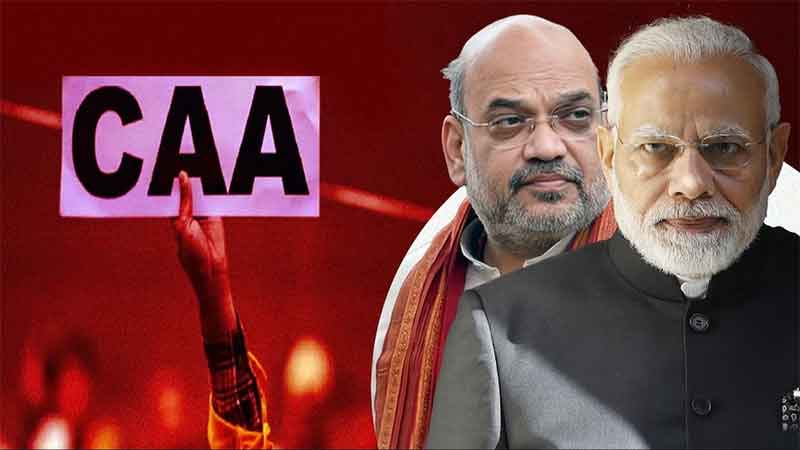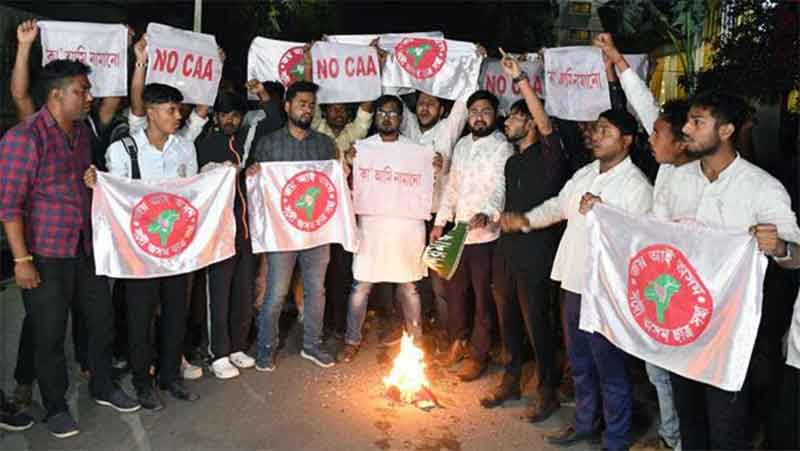
Introduction
The timing and implementation of the CAA rules and online procedure for seeking Indian citizenship just before the 2024 general election have raised serious questions about the intention of the union government. It is widely believed that this move was made by the union government to divert public attention from its massive failures over the past decade and the latest setback from the apex court over electoral bonds. Despite being unconstitutional, illegal, and unethical, the CAA has been implemented, while around two hundred petitions have been filed against it. The inherent complexities and contradictions of the CAA are already in the public domain, but the Supreme Court has yet to examine its constitutionality. This situation demands immediate attention from all concerned parties to ensure that justice is served and such unconstitutional legislation must be resisted tenaciously.
Recently, the Indian government made it clear that the Citizenship Amendment Act (CAA) also aims to further the concept of United India, or Akhand Bharat (see interview of Sh Amit Shah to ANI on 14.03.2024, also available on NDTV website). However, critics see the concept of Akhand Bharat as an attempt to build a theocratic state based on Hindutva ideology, which lacks nuance and could be detrimental to South Asia’s regional stability as well as international peace. Any call for Akhand Bharat would give rise to India’s ambitions for expansion, endangering the peace and security of the area. This demand ignores the goals and sovereignty of surrounding countries, which fuels tensions on the geopolitical, ethnic, and religious fronts, particularly in South Asia. It is critical to comprehend the larger implications of this law and the disastrous situation it may create if not rolled back. While the CAA may seem like a well-intentioned legislation aimed at giving expedited citizenship to persecuted minorities from neighbouring countries, a closer examination reveals a sectarian law that ignores international obligations and goes against India’s constitutional ethos.
Why CAA unconstitutional, illegal and unethical
In 2019, the Indian Parliament passed the Citizenship Amendment Act (CAA), a law that has stirred controversy and division within the country. The CAA deviates from the fundamental principles of the Indian Constitution, as it is discriminatory towards Muslims, who form a minority group in India. The law intends to provide citizenship rights based solely on religion to religious minorities from neighbouring nations, which goes against Article 14 of the Indian Constitution and is fundamentally unfeasible. The Citizenship Act of 1955 outlines five methods to obtain Indian citizenship, such as birth, descent, registration, naturalisation and the incorporation of a region into India. However, the CAA contradicts these methods and instead, bases citizenship on one’s religion. The “reasonable classification” defence taken by the government is not tenable under the eyes of the law. Rather it is not “reasonable classification” but “class legislation” hence fundamentally wrong and unconstitutional. Moreover, the CAA also hit the Preamble of the Indian Constitution which declared that India is a secular, democratic republic.
The Citizenship Amendment Act (CAA) flagrantly contravenes the principles of plural and heterogenous society, equality, and justice enshrined in the Constitution of India. By introducing the concept of citizenship based solely on religious identity, the CAA discriminates against those who do not belong to the specified religious minorities. This not only violates the fundamental tenet of secularism, which is integral to the Constitution, but also undermines a host of other fundamental rights, such as the right to equal treatment under the law (Article 14), neutrality of the State with respect to religion (Articles 15 and 16), freedom of religion (Articles 25, 26, 27, and 28), and enhanced protection to minorities (Articles 29 and 30). The CAA is therefore ultra vires and must be challenged as a gross violation of the Constitution and the basic feature of secularism.
It’s worth noting that the standard period of eleven years for foreign nationals who are lawfully residing in the country cannot be altered to six years for a particular group of people as specified by the CAA. Doing so violates Article 14 of the Constitution, as it is both arbitrary and discriminatory. Additionally, the selection of the cut-off date is arbitrary and runs contrary to the Constitutional principle of equity and natural justice as outlined in the CAA rules. While the Parliament has the authority to designate December 31, 2014, as the expiry date for the classification of certain immigrants as citizens, such a decision must be logical and consistent with the Act’s stated objective. The CAA rules specifically zeroed on the deadline of 31 December 2014, and citizenship benefits will be given only to those who entered India as illegal immigrants before the above deadline. Shockingly, there is no evidence to suggest that the migration that occurred before December 31st, 2014, was solely due to religious persecution. Therefore, this decision must be reconsidered and aligned with the principles of fairness and equality that are enshrined in our Constitution. It is unclear why the deadline for migration was set for December 31st, 2014, and what will happen to those who migrated after that date. Furthermore, it begs the question as to why the CAA is not providing benefits to those who have migrated illegally after the stipulated deadline.
The current form of CAA and the latest rules rolled out present inconsistencies and inherent complexities of this contentious legislation. Given that persecution of minorities is an ongoing issue, why was a deadline of December 31, 2014 put in place? It appears that the CAA is being used to send a clear message that Muslims will not be included in this pathway. It is incorrect to claim that there are no persecuted Muslim groups in the surrounding area. The Act effectively creates a religious-based distinction in how migrants, persecuted minorities, and refugees are treated. Its ultimate goal seems to be the transformation of Indian citizenship and the reinforcement of the notion that Muslims are not a natural part of India.
CAA-basically a sectarian law
The CAA indeed introduces amendments to the Citizenship Act of 1955, ostensibly to provide a pathway to Indian citizenship for undocumented immigrants from neighbouring countries who belong to specific religious communities. Firstly, the Act’s selective inclusion of certain religious groups while excluding others has been a focal point of criticism. By offering a route to citizenship exclusively to Hindus, Sikhs, Buddhists, Jains, Parsis, and Christians, the Act conspicuously omits Muslims. This exclusionary approach has elicited allegations of religious discrimination, fundamentally challenging the secular character of India as enshrined in its Constitution. Critics argue that such preferential treatment based on religion violates the principle of equality before the law and undermines the foundational ethos of India as a secular, pluralistic democracy.
The emphasis on religious identity as a criterion for acquiring citizenship under the Act raises concerns about the state’s role in determining citizenship. Citizenship has traditionally been based on factors such as birth, descent, or naturalisation, rather than religious affiliation. The Act’s introduction of religion as a defining factor sets a precedent that could potentially politicize and communalize the citizenship process, thus altering the secular fabric of the nation. In addition, the Act’s geographical scope, which focuses solely on migrants from Afghanistan, Bangladesh, and Pakistan, adds another layer of complexity. Critics argue that by singling out these countries, the Act implicitly targets Muslims, who are the majority population in Bangladesh and Pakistan. This geopolitical dimension reinforces the perception of religious bias inherent in the Act’s provisions. Moreover, the Act excludes the religious minorities of Bhutan, Sri Lanka, China, and Myanmar, and there is no clarity as to why this is the case.
The CAA’s proponents contend that the primary aim of this legislation was to alleviate the suffering of religious minorities that are persecuted in bordering Islamic nations-Pakistan, Bangladesh and Afghanistan. They argue that specific laws are needed to protect Christians, Parsis, Jains, Buddhists, Hindus, Sikhs, and Buddhists from systematic discrimination and persecution in these countries. Constitutional experts contend that the CAA’s limited focus on religious persecution ignores other types of oppression people experience because of their gender, caste, political convictions, or linguistic identity. This selective approach weakens the humanitarian aim of the Act by perpetuating a hierarchy of suffering and undermining the universality of human rights. Further, the CAA rules explained the type of religious persecution in Pakistan and Bangladesh but nothing mentioned about what kind of persecution is being orchestrated in Afghanistan.
The CAA’s enactment ignited widespread protests across India, with demonstrators decrying it as unconstitutional and divisive. The issue of religious discrimination has galvanized various segments of society, including civil society groups, opposition parties, and religious minorities, who have vociferously opposed the Act on moral, legal, and ethical grounds. The current structure of the Citizenship Amendment Act 2019 represents a contentious departure from India’s secular ethos, introducing religious identity as a criterion for citizenship while excluding Muslims. The Act’s selective inclusion of certain religious groups raises concerns of discrimination and communal polarization, challenging the foundational principles of equality and secularism enshrined in the Indian Constitution. The ensuing debates underscore the imperative of upholding India’s secular fabric while addressing legitimate concerns regarding persecution and the protection of vulnerable communities.
CAA is a gross violation of international law
The Citizenship Amendment Act (CAA) 2019, through its selective treatment of immigrants based on religion, indeed represents a flagrant violation of various international treaties and conventions to which India is a signatory party. The Act’s provisions directly contravene fundamental principles enshrined in key international instruments, including the International Covenant on Civil and Political Rights (ICCPR) 1966, the International Convention on the Elimination of All Forms of Racial Discrimination (ICERD) 1965, the UN Convention against Torture, and the Universal Declaration of Human Rights (UDHR) 1948.The ICCPR, a cornerstone of international human rights law, unequivocally prohibits discrimination on various grounds, including religion. Article 2 of the ICCPR mandates that all individuals are entitled to the rights and freedoms set forth in the Covenant without discrimination of any kind, including on the basis of religion. By granting preferential treatment to immigrants belonging to specific religious groups while excluding others, the CAA blatantly violates this principle of non-discrimination, thereby undermining India’s obligations under the ICCPR.
Similarly, the ICERD seeks to eliminate all forms of racial discrimination and advocates for equal treatment before the law, irrespective of race, colour, or national or ethnic origin. By delineating citizenship eligibility based on religious identity, the CAA perpetuates a form of discrimination that runs counter to the objectives of the ICERD. The Act’s exclusion of Muslims from its purview not only exacerbates religious tensions but also reinforces a hierarchy of belonging, thereby undermining the spirit of equality and non-discrimination espoused by the ICERD.
Furthermore, the UN Convention against Torture prohibits the expulsion, return, or extradition of individuals to countries where they may face torture or cruel, inhuman, or degrading treatment. While the CAA ostensibly aims to provide refuge to persecuted minorities, its exclusive focus on religious identity disregards the broader spectrum of persecution faced by individuals based on political beliefs, caste, gender, or linguistic identity. This selective approach not only undermines the universality of human rights but also raises concerns about the protection of vulnerable populations under the Convention against Torture.
The UDHR, a foundational document in the field of human rights, unequivocally asserts the principle of equality and non-discrimination. Article 2 of the UDHR proclaims that everyone is entitled to all the rights and freedoms outlined in the Declaration without distinction of any kind, such as race, colour, sex, language, religion, political or other opinions, national or social origin, property, birth, or other status. By privileging certain religious groups over others, the CAA violates the spirit of this universal declaration and undermines the fundamental principles of equality and non-discrimination enshrined therein. The current form of the Citizenship Amendment Act 2019 can be seen as a violation of international law, specifically the principles of key human rights treaties and conventions that India has signed. By discriminating against immigrants based on their religion, the Act undermines the basic principles of equality, non-discrimination, and international human rights law. At this point, the international community may have an opportunity to raise India’s case at the Security Council and UNGA to ensure accountability for its obligations under these treaties. They can also condemn any legislative measures that perpetuate discrimination and inequality.
CAA and ideology of expansionist nationalism
The Union Home Minister recently declared that the Citizenship Amendment Act (CAA) aims to create a United India, also known as Akhand Bharat.[2] However, the idea of Akhand Bharat is a controversial and dangerous concept as it promotes expansionist nationalism. This ideology opposes liberal nationalism, secular politics, and democratic values, as well as inclusion, diversity, and social progress. Expansionist nationalism is characterized by chauvinistic mindsets and jingoistic language that often leads political leaders to identify scapegoats to gain political advantage. If the Union Minister for Home Affairs endorses such statements, it implies that the Indian state has disregarded established principles of international law, along with numerous international treaties and conventions.
Political scientists and jurists have referred to this draconian ideology as a vital stage in Indian politics, one that is moving the country from a modern nation-state to a chauvinistic state. No sane individual can support the idea of establishing a state that is solely for a specific race or religion, or support expansionist ideology hidden under the cover of nationalism or ultra-nationalism. According to recognised international legal principles, any demand for Akhand Bharat amounts to an act of war since it disrupts the other nation’s sovereignty, integrity, and regional territory. There could be dire repercussions for anyone trying to operationalize this expansionist nationalism in any way, whether overt or covert. Such a provocation through an inflammatory statement must be avoided when India has already been facing global isolation on various fronts. Further, such an outburst from the leading political personality may prove costly for India’s international image as a peaceful nation that respects international law and believes in the ethos of the United Nations.
The Citizenship Amendment Act (CAA) has been criticized for being an attempt to establish India as a Hindu theocratic state and to promote the expansionist agenda of the current government in New Delhi. This move could lead to escalated tensions between India and its neighbouring countries, as it reflects an expansionist ideology that poses a threat to the stability and peace of the South Asian region. The concept of Akhand Bharat, which refers to the idea of a united India, has historical roots in ancient empires and territorial expansionism. However, under the current BJP government in New Delhi, it has been revived with nationalistic fervour. The proponents of this ideology, influenced by the Hindu nationalist ideologies of Golwalkar, Hedegewar, and Savarkar, seek to restore perceived lost territories, regardless of the diverse identities and sovereign aspirations of neighbouring nations. Such rhetoric is baseless and unrealistic in the modern global political scenario.
In light of the current state of world affairs, the idea of Akhand Bharat is absurd and incompatible with the established norms of international law. This phrase refers to India’s purported expansionist goals, which are masked by claims of historical unity and cultural or religious affinity. Many nations in the region view the idea of annexing adjacent territory in order to create a single, unified Indian state as a clear breach of the concepts of territorial integrity and their sovereignty. This is nothing more than unjustified meddling in the foreign nation’s domestic affairs. This expansionist agenda is evocative of colonial goals and seriously jeopardises the autonomy and sovereignty of India’s neighbours, inciting unrest and instability in the area. The aim of Akhand Bharat has intensified regional rivalries and sparked new territorial issues. This has increased the likelihood of armed conflict and militarization. India’s expansionist goal is viewed with mistrust and trepidation by its neighbours, who worry that it may result in the loss of their sovereignty. A major threat to global peace and stability in South Asia is posed by the pursuit of Akhand Bharat, which exacerbates already-existing tensions and ignites geopolitical rivalries. The international community needs to act appropriately to prevent the issue from getting worse because it is quite concerning.
Advocating for the concept of Akhand Bharat, or United India, may potentially harm India’s diplomatic relations with neighbouring countries and the international community. This approach undermines mutual trust and cooperation, hampering diplomatic efforts to resolve longstanding disputes through dialogue and diplomacy. India’s isolationist stance poses a risk of marginalization in regional forums and global alliances, reducing its soft power and influence on the world stage. This fallout may significantly impact India’s economic and strategic interests in the Middle East and South Asia. Therefore, the demand for United India or Akhand Bharat highlights India’s expansionist ambitions, posing a threat to regional stability and international peace in South Asia. This approach disregards the sovereignty and aspirations of neighbouring nations, perpetuating ethnic, religious, and geopolitical tensions. Rather than pursuing expansionist agendas, India should prioritize dialogue, cooperation, and respect for the principles of sovereignty and self-determination to foster genuine peace and prosperity in the region.
Narender Nagarwal teaches at Campus Law Centre, Faculty of Law, University of Delhi
[2] https://www.ndtv.com/india-news/amit-shah-citizenship-amendment-act-caa-why-parsis-christians-caa-eligible-but-not-muslims-amit-shah-explains-5235705#pfrom=home-ndtv_topscroll













































